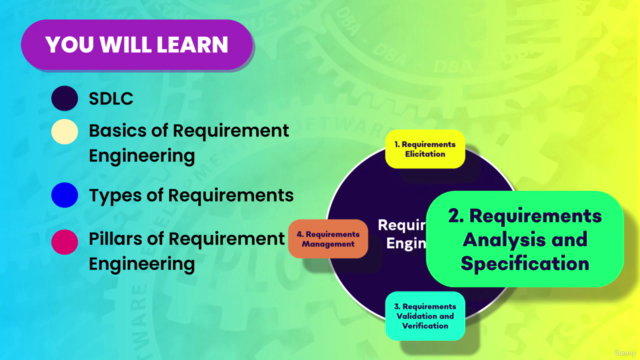Complete IT Requirements and Requirement Engineering Course

Why take this course?
Based on the detailed outline you've provided, it seems like this course is designed to cover a comprehensive set of topics related to requirement engineering and management within software development projects. Here's a recap of the key points from your outline:
-
Understanding Requirement Engineering: This foundation sets the stage for the subsequent topics by explaining what requirement engineering entails, including its importance in creating successful software products.
-
Types of Requirements: The course will likely differentiate between functional and non-functional requirements, explaining the characteristics and purposes of each.
-
Requirements Elicitation Techniques: Various methods for gathering requirements from stakeholders will be covered, emphasizing the importance of understanding needs and expectations.
-
Documenting Requirements: This part of the course should guide learners on how to write clear, concise, and complete requirement specifications that can be easily understood by all parties involved.
-
Managing Requirements in Agile Projects: Adapting requirements management practices to fit agile development environments will be discussed, highlighting the flexibility and iterative nature of these projects.
-
Change Control or Change Management Process: The course will cover how to handle changes to requirements effectively, including defining rules for changes and managing them through their lifecycle.
-
Change Management Process Flow: Steps for systematically managing changes within a project will be outlined, ensuring that any alterations do not compromise the integrity of the product.
-
Change Request Lifecycle: The stages that a change request goes through from initiation to closure will be explained.
-
Roles and Responsibilities in the Change Management Process: The course will define who is responsible for what within the change management process, ensuring clarity and accountability.
-
Effect of Change on Project Resources: Assessing the impact of changes on time, budget, and project scope is crucial, and this aspect will be covered to help learners anticipate and manage such impacts.
-
Requirement Status Tracking: The course will explain how to monitor the progress and status of requirements throughout the development process.
-
Requirements Tracing: Ensuring that all requirements are implemented, tested, and delivered as intended is essential for quality assurance.
-
Requirement Attributes to Track: Key attributes such as priority, complexity, and dependencies will be discussed to help learners understand what to monitor in a set of requirements.
-
Requirement Attribute List: A detailed list of attributes that are typically tracked will be provided for comprehensive management.
-
Conclusion: The course will wrap up by summarizing the key points and emphasizing the importance of thorough requirement engineering for successful software projects.
The course also addresses common questions about requirements, engages stakeholders effectively, and manages the challenges of agile projects. It ends with a 30-day full money-back guarantee to ensure learners' satisfaction.
Yogesh Dahake, the instructor, presents himself as an experienced software engineer and educator who aims to provide simple, effective learning experiences. He encourages learners to enroll in the course for a comprehensive understanding of requirement engineering within 14 hours of instruction.
The course is suitable for a wide range of individuals, from those just starting their careers to professionals already working in the software industry, including developers, lead engineers, technical architects, testers, business analysts, and anyone interested in the field of software development.
Overall, this course seems to offer a well-rounded approach to requirement engineering, with a focus on practical application in various software development contexts, particularly emphasizing agile methodologies.
Course Gallery




Loading charts...